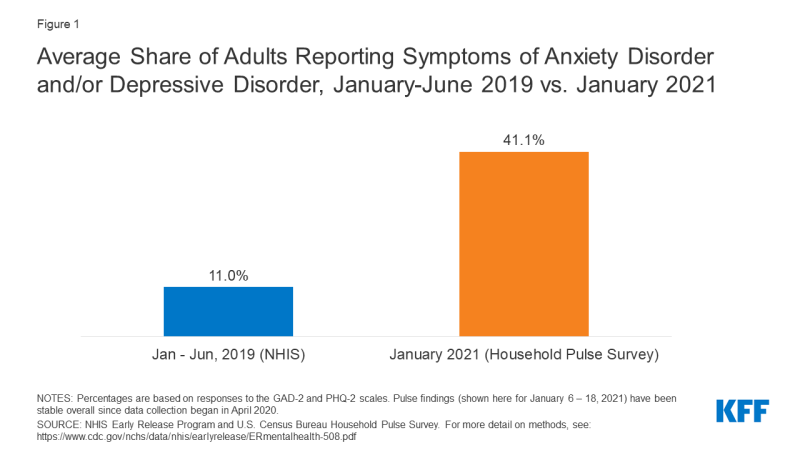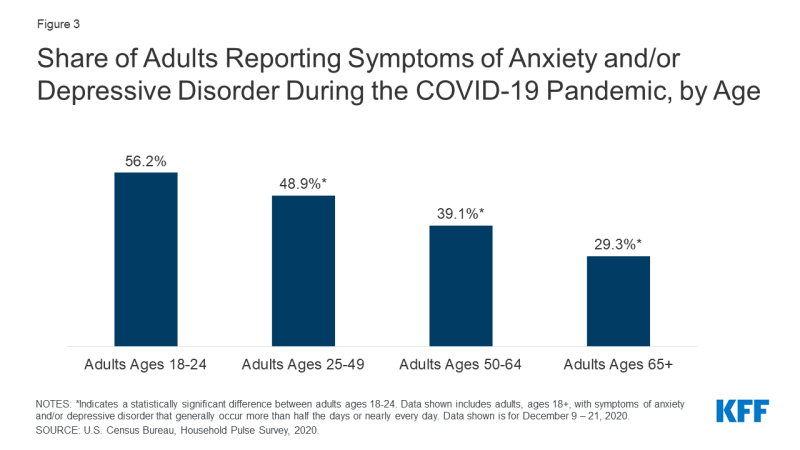We are coming up on one year of quarantine as a result of the COVID-19 pandemic. In that time, quite a lot has changed for the everyday person. From eating habits, working at home, spending more time with one’s family, growing in one’s health journey or gaining weight, becoming depressed, and struggling with one’s mental health.
In this blog post, I will be focusing on the impact COVID-19 had on the mental health of people, specifically in the United States. A year is a long time for one’s mental health to change. For example, according to the Commonwealth Fund, Los Angeles has seen an 8000% increase in calls to suicide and mental health hotlines.

Source: Statista
The graphic above gives an insight as to which countries have experienced the most impact from mental health struggles and it shows that the United States is the one to have a 33% increase compared to the rest of the world. What has caused such a rapid increase to occur?
By exploring the social determinants of health, we may gain some answers. First, employment- many people were let go from their jobs or had lower pay thereby reducing the chances of staying busy or driven and having the added stress of financial maintenance that may not have been there before. With that comes the added insecurity of access to food, housing, and healthcare resources. The stress of the uncertainties that came with the pandemic itself has also caused a rise in mental health struggles. People have gotten sick, gone to hospitals, and even died during the pandemic due to the virus and that added emotional stress has caused a toll on people.
The pandemic has helped in the growth of telemedicine, especially the availability of mental health counselors, therapists, social workers, and more. Preston Kadleck, a therapist who was written about in National Geographic, stated that there are now enough social workers or people licensed to give counsel in the United States to help everyone. The issue that arises is access to these experts. He brings up a valid point that volunteers are a vital part of hotlines and help people step back from the edge of whatever volatile emotion they may be feeling, but they are not licensed and do not have the right resources to help a person understand what it is they are experiencing, how to cope with it, and build healthier habits to combat negative emotions that could result in negative actions. The link here provides a wonderful graphic that I was unable to add to the blog due to copyright issues. It shows the access to mental health resources by state and how they fare due to the lack of said resources.
The next question that arises is then how do we increase access to mental health providers to reduce the struggle of mental health? Something like telehealth is a great start. Yet for some people, telehealth coverage is not included in their insurance. Therefore, one solution would be to expand health insurance coverage to include mental health providers. And the coverage should not have outrageous copays, especially during a pandemic. You know, if it is telehealth, why does a provider network matter for certain insurance carriers? By asserting more control over the health of people, it causes more stress, anxiety, depression, and more to increase and start in a vicious cycle.

This bar graph comparison shows a clear increase in anxiety and/or depression in 2019 compared to 2021.

This article by the KFF does a great job of breaking down the percentages and changes of anxiety and depressive disorder development in the United States before the pandemic and during the pandemic. The article does well to address the people that already had mental health issues in their life before the pandemic and how their situations were exasperated during the pandemic. It specifies per section an age group that has been impacted. For example, it focuses on young adults who are ages 18-24 who have experienced pandemic-related stress which has increased mental health struggles. Some of that stress is from schools closing and transitioning to 100% online education. Other stress includes losing one’s job or reduced hours as well as the risk of working during the pandemic and being distrustful of people who may not be taking protective measures properly.
The stress of wearing a mask and covering one’s face is another huge factor that is not discussed often. Our society functions on interactions with one another which includes facial expressions and socializing in close circles or going out. By wearing masks, we have closed ourselves off to a major source of interaction which is reading one another’s facial expressions and interacting based on the reactions one has with the other. Something so small was not even realized until the pandemic and makes one question if we, as a society, took it for granted previously. The isolation that comes with putting a mask on and feeling alone along with the literal isolation during the pandemic really caused the rise in anxiety or depressive disorders to increase substantially. Will we go back to being “normal” after the pandemic?
East Asian countries such as China, Korea, and Japan include masks as part of their daily lives. Some of it is due to air pollution, fashion, being respectful of people around them if they are sick, and for some, it’s to be a bit more protected against smoking. Therefore, would people be completely opposed to keeping the masks even after the mandates subside? Personally, I don’t think so. An element of that has to do with being worried or nervous about what germs or illnesses someone else may have. While that may make our society less trusting of one another at the beginning (which is another mental health concern), it would provide a sense of security to everyone in knowing that they are looking out for their own health and the health of others.
It’s clear to say that the mental health status of Americans has steadily deteriorated over the last year, but it makes Americans that much more determined to persevere in the face of difficulties. I look forward to the positive changes this pandemic may possibly bring, even if it takes a while. Until then, if you need someone to talk to, hotlines are great for a conversation, but please reach out to someone who is able to give you professional guidance without any judgement; someone who wants the best for you.

There are no comments yet...Kick things off by filling out the form below.